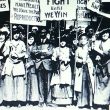The youth protesters in Spain have inspired many with the stand they have taken against austerity policies and the political establishment. However, they have also faced brutal state repression.
In order to clear the Plaza de Catalunya, the central square of Barcelona, of protesters, hundreds of police surrounded and waded into the crowd in an unprovoked attack on peaceful protesters. The youth have since regrouped and retaken the Plaza. However, these events show the danger the state poses to movements which challenge the current system.
This kind of repression will also be used against movements of young people and workers in Ireland. We have already seen the willingness of the state to shut down the centres of Dublin and Cork to facilitate the Queen’s visit. Brutal police violence has been used against the Shell to Sea campaigners in Rossport and against the student protests in Dublin last year. Meanwhile, the criminals in the banks whose greed helped bring the country to economic ruin have been left untouched by the forces of “law and order”.
The fact that state repression is used consistently against movements which oppose the status quo is no coincidence. Under capitalism, the police and other forces of the state are not democratically accountable to working class people. The state is a reflection of a society run in the interests of a super-rich minority. It ultimately serves to defend these interests and the capitalist system itself. This is a reality for which the Left and the workers movement must prepare, both politically and by being organised to deal with state repression. Where the police are used to break up protests or workers actions, as happened during the Thomas Cook workers occupation, the workers movement should be prepared to organise a democratic defence of these movements.
While being ready to oppose all attempts at state repression, the socialist movement should also recognise that there are real divisions at the heart of the state, and rank-and-file police will also be affected by the capitalist crisis. This can have a political impact. Part of the role of the workers’ movement must also be to attempt to exploit these divisions to split the state along class lines.
Socialist Youth calls for a genuinely accountable police force under the total democratic control of communities. This can only be achieved on the basis of a socialist society where wealth and power is taken into the hands of working class people.









